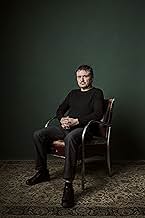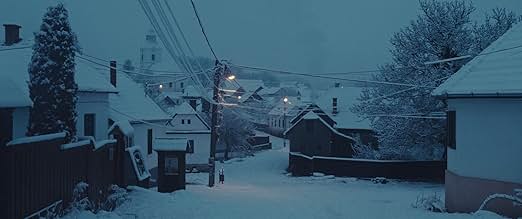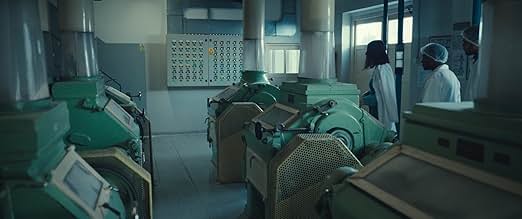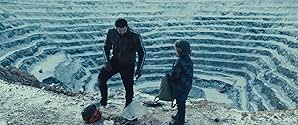VALUTAZIONE IMDb
7,2/10
6279
LA TUA VALUTAZIONE
Un'analisi non giudicante delle forze trainanti del comportamento umano di fronte all'ignoto, del modo in cui percepiamo l'altro e di come ci relazioniamo con un futuro inquietante.Un'analisi non giudicante delle forze trainanti del comportamento umano di fronte all'ignoto, del modo in cui percepiamo l'altro e di come ci relazioniamo con un futuro inquietante.Un'analisi non giudicante delle forze trainanti del comportamento umano di fronte all'ignoto, del modo in cui percepiamo l'altro e di come ci relazioniamo con un futuro inquietante.
- Premi
- 7 vittorie e 18 candidature totali
Endre Rácz
- Tibi
- (as Rácz Endre)
Recensioni in evidenza
Cristian Mungiu is one of the "founding fathers" of the Romenian new wave that started around 2005 with movies such as "The death of Mr Lazarescu" (2005, Cristi Puiu), "12:08 East of Bucharest" (2006, Corneliu Porumboiu) and of course the breakthrough movie of Mungiu himself "4 month, 3 weeks and 2 days" (2007). More than 15 years later the Romenian new wave is still alive and kicking. In 2022 the experienced director Mungiu delivers an excellent movie with "R. M. N" but there is also the "new name" Alexandru Belc with "Metronom". New name is maybe a bit exaggerated because Belc already contributed to the script of "4 month, 3 weeks and 2 days".
"Metronom" is situated in 1972 during the Ceausescu years and is thus typical Romenian. "R. M. N" covers more general themes. It is about Matthias (Marin Grigore) and his home village. After working in Germany for a while Matthias returns to his home village. In this village three Sri Lankan workers arrive at the local bakery because vacancies are difficult to fill (many workers work in the West). The arrival of the Sri Lankan workers leads to a lot of tension in the local community.
The above description seems to indicate that "R. M. N" is above all about racism, and that is not entirely untrue. In a key scene with a duration of twenty minutes there is a meeting in the village hall. In this meeting all prejudices against the Sri Lankan (and foreigners in general) are given free reign.
In my opinion "R. M. N" is about racism but not only about racism. It is also about hypocrisy. I give a number of examples.
In the first place Romanians working in Germany is no problem, but a Sri Lankan working in Romania is.
The film is situated in Transsylvania, a region with a Hungarian minority. This minority wants not to be discriminated against, but on the other hand has no problem discriminating other people.
There are also people defending the Sri Lankan workers, but this are their employers that have an economic interest. Their defence that no Romenian reacted on the vacant positions meets with the reply that they were only willing to pay minimum wages. So their bevaviour has at least a hint of hypocrisy to it. They are certainly not the good guys against the evil and dumb majority. In the films of Mungiu there seldom is a simplistic good versus bad distinction. In this respect the portrayel of one of the empoyers (Csilla Szabo played by Judith State) as always drinking a glass of red wine and always playing the cello was already a bit too "bourgeois" to my liking.
The village of the movie is situated on the edge of a primaeval forest. This is no coincidence as the forest symbolizes mystical and animal spirits, with recurring references to brown bears. These animal spirits overtake rational thought when it comes to reacting to foreigners. This is illustrated in the meeting in the village hall (in the scene already mentioned to) when some villagers tried to wrap their prejudices in rational arguments (maybe the foreigners carry unknown viuses with them). When their argument is refuted (we let them work with protecting rubber handshoes) the prejudice inside shows itself (but we simply don't want them here).
"R. M. N" is an ominous film with mob violence constantly in the air. In this respect it resembles "Werckmeister Harmoniak" (2000, Bela Tarr), although the last mentioned film is more abstact. The resemblance was for me the most obvious in the new years day parade with people in bear costumes fighting a neighbouring village as part of a new year tradition. For me this scene was the most Tarr like combining in an abstract manner animal spirits with xenophobia. The twenty minutes scene in the village hall did the same thing, but in a much more concrete way. This scene is more characteristic of Cristian Mungiu himself.
"Metronom" is situated in 1972 during the Ceausescu years and is thus typical Romenian. "R. M. N" covers more general themes. It is about Matthias (Marin Grigore) and his home village. After working in Germany for a while Matthias returns to his home village. In this village three Sri Lankan workers arrive at the local bakery because vacancies are difficult to fill (many workers work in the West). The arrival of the Sri Lankan workers leads to a lot of tension in the local community.
The above description seems to indicate that "R. M. N" is above all about racism, and that is not entirely untrue. In a key scene with a duration of twenty minutes there is a meeting in the village hall. In this meeting all prejudices against the Sri Lankan (and foreigners in general) are given free reign.
In my opinion "R. M. N" is about racism but not only about racism. It is also about hypocrisy. I give a number of examples.
In the first place Romanians working in Germany is no problem, but a Sri Lankan working in Romania is.
The film is situated in Transsylvania, a region with a Hungarian minority. This minority wants not to be discriminated against, but on the other hand has no problem discriminating other people.
There are also people defending the Sri Lankan workers, but this are their employers that have an economic interest. Their defence that no Romenian reacted on the vacant positions meets with the reply that they were only willing to pay minimum wages. So their bevaviour has at least a hint of hypocrisy to it. They are certainly not the good guys against the evil and dumb majority. In the films of Mungiu there seldom is a simplistic good versus bad distinction. In this respect the portrayel of one of the empoyers (Csilla Szabo played by Judith State) as always drinking a glass of red wine and always playing the cello was already a bit too "bourgeois" to my liking.
The village of the movie is situated on the edge of a primaeval forest. This is no coincidence as the forest symbolizes mystical and animal spirits, with recurring references to brown bears. These animal spirits overtake rational thought when it comes to reacting to foreigners. This is illustrated in the meeting in the village hall (in the scene already mentioned to) when some villagers tried to wrap their prejudices in rational arguments (maybe the foreigners carry unknown viuses with them). When their argument is refuted (we let them work with protecting rubber handshoes) the prejudice inside shows itself (but we simply don't want them here).
"R. M. N" is an ominous film with mob violence constantly in the air. In this respect it resembles "Werckmeister Harmoniak" (2000, Bela Tarr), although the last mentioned film is more abstact. The resemblance was for me the most obvious in the new years day parade with people in bear costumes fighting a neighbouring village as part of a new year tradition. For me this scene was the most Tarr like combining in an abstract manner animal spirits with xenophobia. The twenty minutes scene in the village hall did the same thing, but in a much more concrete way. This scene is more characteristic of Cristian Mungiu himself.
This is not a film for those of us who watch movies casually. If you pay close attention to the gloriously intricate details of this film, the ending will leave you speechless and full of ruminations for days (maybe even weeks) to come.
The characters in this film are not cartoonish one-note ideas -- they're complex full human beings. We have a brilliant anti-hero as our lead, a morally-confused "working woman" type as our second lead, and a village whole as our third lead. Think this sounds boring? Give the film a chance and let it seep in. It's firing on all cylinders - beautiful, moody, dark, socially-relevant without being preachy or preening.
Mungiu is a master and has yet to make a bad movie.
The characters in this film are not cartoonish one-note ideas -- they're complex full human beings. We have a brilliant anti-hero as our lead, a morally-confused "working woman" type as our second lead, and a village whole as our third lead. Think this sounds boring? Give the film a chance and let it seep in. It's firing on all cylinders - beautiful, moody, dark, socially-relevant without being preachy or preening.
Mungiu is a master and has yet to make a bad movie.
It's been half a decade since Cristian Mungiu's previous film, the excellent Bacalaureat/Graduation, and there's a bit of its thematic DNA in his most recent work. The movie goes beyond that though by exploring a real event which left its mark on Romanian society a few years ago, an event littered with prejudice and xenophobia. R. M. N. Is a bit messy and concludes in an unsatisfying fashion, but rewards the viewer with a layered experience.
From the get-go, there's a coldness to R. M. N. (Romanian abbreviation for Magnetic Resonance Imaging) that you can't shake - it's visual, it's seasonal and it's in the lead character, a monosyllabic bear of a man named Matthias. After an incident occurs while working abroad, he returns home, where more coldness awaits him, as he's met by a distant wife, an emotionally stifled child and a circumspect lover. His home village, set between mountains and forests, stands out by being multiethnic - predominantly Hungarians and Romanians, but also some Germans, like Matthias. The interaction between Mungiu's characters is fascinating to watch, as they transition seamlessly between languages, portraying a well-knit, burgeoning community. It is only after a couple of Sri-Lankan workers arrive to work at the local bakery that the the xenophobe's nest starts stirring.
The movie has a strong build-up, creating a tense atmosphere while setting all its pieces in place. Its characters are faced with more agency than one usual sees, working the underlying beliefs and attitudes onto the screen. And when things turn, they turn quickly and viscously, yet almost unexpectedly - feeding on a sense of unexpressed resentfulness, a feeling primed by our lead's emotional literacy. Similarly to another recent Romanian movie themed around prejudices, Radu Jude's Bad Luck Banging or Loony Porn, R. M. N. Climaxes at a town meeting, where all the paper-thin-arguments you're friendly Facebook neighbour would have shared are laid bare.
To me, this is where the movie wavers. Even as Mungiu tries to maintain a less than judgmental distance from its subjects, there's something so banal and un-cinematic about this kind of stand-off, that it simply cannot carry the burden imposed by the narrative arc. The scene works in spite of this, it works because of the little details and the (un)expected escalation, but it's not a worthy pay-off to what preceded it. And the conclusion that follows it even less so, being close to the absurd in spite of striving for symbolism.
Still, R. M. N. Shouldn't leave you unimpressed. It tackles big themes with passionate interest and concern, which makes up for any shortcomings, thereby proving a worthy addition to Mungiu's impressive catalogue of films.
From the get-go, there's a coldness to R. M. N. (Romanian abbreviation for Magnetic Resonance Imaging) that you can't shake - it's visual, it's seasonal and it's in the lead character, a monosyllabic bear of a man named Matthias. After an incident occurs while working abroad, he returns home, where more coldness awaits him, as he's met by a distant wife, an emotionally stifled child and a circumspect lover. His home village, set between mountains and forests, stands out by being multiethnic - predominantly Hungarians and Romanians, but also some Germans, like Matthias. The interaction between Mungiu's characters is fascinating to watch, as they transition seamlessly between languages, portraying a well-knit, burgeoning community. It is only after a couple of Sri-Lankan workers arrive to work at the local bakery that the the xenophobe's nest starts stirring.
The movie has a strong build-up, creating a tense atmosphere while setting all its pieces in place. Its characters are faced with more agency than one usual sees, working the underlying beliefs and attitudes onto the screen. And when things turn, they turn quickly and viscously, yet almost unexpectedly - feeding on a sense of unexpressed resentfulness, a feeling primed by our lead's emotional literacy. Similarly to another recent Romanian movie themed around prejudices, Radu Jude's Bad Luck Banging or Loony Porn, R. M. N. Climaxes at a town meeting, where all the paper-thin-arguments you're friendly Facebook neighbour would have shared are laid bare.
To me, this is where the movie wavers. Even as Mungiu tries to maintain a less than judgmental distance from its subjects, there's something so banal and un-cinematic about this kind of stand-off, that it simply cannot carry the burden imposed by the narrative arc. The scene works in spite of this, it works because of the little details and the (un)expected escalation, but it's not a worthy pay-off to what preceded it. And the conclusion that follows it even less so, being close to the absurd in spite of striving for symbolism.
Still, R. M. N. Shouldn't leave you unimpressed. It tackles big themes with passionate interest and concern, which makes up for any shortcomings, thereby proving a worthy addition to Mungiu's impressive catalogue of films.
Not sure what the message of the movie was supposed to be. There are two separate stories, one with a kid who saw something scary and is not able or willing to speak anymore after it, the second with a couple of immigrant workers who are not welcomed by the locals in the village.
Not much is happening in any of the stories, and definitely nothing that has not been depicted better in other movies.
The end of the movie is really, really confusing, with a woman who is asking forgiveness for something, not clear at all what exactly, then some bear figures hiding in the woods around her house... The movie left me with the sensation that I just wasted two hours that I could have spent in a better way.
Not much is happening in any of the stories, and definitely nothing that has not been depicted better in other movies.
The end of the movie is really, really confusing, with a woman who is asking forgiveness for something, not clear at all what exactly, then some bear figures hiding in the woods around her house... The movie left me with the sensation that I just wasted two hours that I could have spent in a better way.
I don't know this director from Roumania, some kind of a Roumanian Ken Loach, but I guess he is one of the best on the market. I will try to check what he did besides this one. It is not a light hearted story, it speaks of something very serious, dark, realistic, gritty. A tale about racism, intolerance, human behaviour, towards strangers, especially if they are foreigners come to work. I am sure it is like this in many countries, many places. This is not an easy topic to speak about. It is very well told, shown. It may be disturbing because too close to reality, to actual events and tragedies which we don't necessarily hear of.
Lo sapevi?
- QuizMungiu named the film after a Romanian acronym for -nuclear magnetic resonance-, as the film is "an investigation of the brain, a brain scan trying to detect things below the surface".
- Colonne sonoreYumenji's Theme
Composed by Shigeru Umebayashi for In the Mood for Love (2000)
I più visti
Accedi per valutare e creare un elenco di titoli salvati per ottenere consigli personalizzati
- How long is R.M.N.?Powered by Alexa
Dettagli
- Data di uscita
- Paesi di origine
- Lingue
- Celebre anche come
- R.M.N.
- Luoghi delle riprese
- Panemar - Râtu Mare FN, Jucu, Cluj County, Romania(baking factory)
- Aziende produttrici
- Vedi altri crediti dell’azienda su IMDbPro
Botteghino
- Lordo Stati Uniti e Canada
- 46.360 USD
- Fine settimana di apertura Stati Uniti e Canada
- 6121 USD
- 30 apr 2023
- Lordo in tutto il mondo
- 738.520 USD
- Tempo di esecuzione
- 2h 5min(125 min)
- Colore
- Proporzioni
- 2.39 : 1
Contribuisci a questa pagina
Suggerisci una modifica o aggiungi i contenuti mancanti























